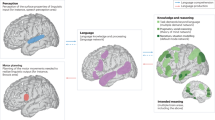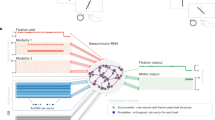Abstract
STUDIES of the visual capacity of neurological patients have provided evidence for a dissociation between the perceptual report of a visual stimulus and the ability to direct spatially accurate movements toward that stimulus. Some patients with damage to the parietal lobe, for example, are unable to reach accurately towards visual targets that they unequivocally report seeing1,2. Conversely, some patients with extensive damage to primary visual cortex can make accurate pointing movements or saccades toward a stimulus presented in their "blind' scotoma3–5. But in investigations of visuomotor control in patients with visual disorders, little consideration has been given to complex acts such as manual prehension. Grasping a three-dimensional object requires knowledge not only of the object's spatial location, but also of its form, orientation and size. We have examined a patient with a profound disorder in the perception of such object qualities. Our quantitative analyses demonstrate strikingly accurate guidance of hand and finger movements directed at the very objects whose qualities she fails to perceive. These data suggest that the neural substrates for the visual perception of object qualities such as shape, orientation and size are distinct from those underlying the use of those qualities in the control of manual skills.
This is a preview of subscription content, access via your institution
Access options
Subscribe to this journal
Receive 51 print issues and online access
$199.00 per year
only $3.90 per issue
Buy this article
- Purchase on Springer Link
- Instant access to full article PDF
Prices may be subject to local taxes which are calculated during checkout
Similar content being viewed by others
References
Damasio, A. R. & Benton, A. L. Neurology 29, 170–178 (1979).
Perenin, M.-T. & Vighetto, A. Brain 111, 643–674 (1988).
Perenin, M.-T. & Jeannerod, M. Neuropsychologia 4, 1–7 (1975).
Weiskrantz, L., Warrington, E. K., Sanders, M. D. & Marshall, J. Brain 97, 709–728 (1974).
Poeppel, E., Held, R. & Frost, D. Nature 243, 295–296 (1973).
Damasio, H. & Damasio, A. R. Lesion Analysis in Neuropsychology (Oxford University Press, New York, 1989).
Milner, A. D. & Heywood, C. A. Cortex 25, 489–494 (1989).
Milner, A. D. et al. Brain (in the press).
Efron, R. Boston Studies in the Philosophy of Science 4, 137–173 (1969).
Jeannerod, M. In Attention and Performance IX (eds J. Long & A. Baddeley) 153–168 (Erlbaum, Hillsdale, New Jersey, 1981).
Ungerleider, L. G. & Mishkin, M. In Analysis of Visual Behavior (eds D. J. Ingle, M. A. Goodale & R. J. W. Mansfield) 549–580 (MIT, Cambridge, 1982).
Maunsell, J. H. R. & Newsome, W. T. A. Rev. Neurosci. 10, 363–401 (1987).
Author information
Authors and Affiliations
Rights and permissions
About this article
Cite this article
Goodale, M., Milner, A., Jakobson, L. et al. A neurological dissociation between perceiving objects and grasping them. Nature 349, 154–156 (1991). https://doi.org/10.1038/349154a0
Received:
Accepted:
Issue Date:
DOI: https://doi.org/10.1038/349154a0
This article is cited by
-
The control and perception of antagonist muscle action
Experimental Brain Research (2023)
-
Intentional action and knowledge-centered theories of control
Philosophical Studies (2023)
-
Visuo-haptic object perception for robots: an overview
Autonomous Robots (2023)
-
Are reaching and grasping effector-independent? Similarities and differences in reaching and grasping kinematics between the hand and foot
Experimental Brain Research (2022)
-
Functional brain changes in Parkinson’s disease: a whole brain ALE study
Neurological Sciences (2022)
Comments
By submitting a comment you agree to abide by our Terms and Community Guidelines. If you find something abusive or that does not comply with our terms or guidelines please flag it as inappropriate.



